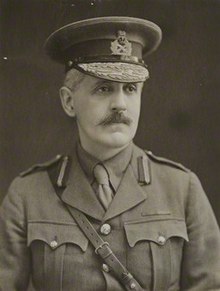Fabian Ware
| Sir Fabian Ware | |
|---|---|
 |
|
| Born |
17 June 1869 Clifton, Bristol |
| Died | 29 April 1949 (aged 79) Amberley, Gloucestershire |
| Allegiance |
|
| Rank | Major General |
| Awards | |
Major General Sir Fabian Arthur Goulstone Ware KCVO KBE CB CMG (17 June 1869 – 29 April 1949) was the founder of the Imperial War Graves Commission, now the Commonwealth War Graves Commission
Born at Clifton, Bristol on 17 June 1869, Ware attended the Universities of London and Paris, obtaining a Bachelier-es-Sciences at the latter in 1894. He then spent ten years as an assistant master at several secondary schools, and as an occasional examiner for the Civil Service Commission and Inspector of Schools for the Board of Education.
In 1899 he started writing articles for the Morning Post. He became the representative of the Education Committee of the Royal British Commission at the Exposition Universelle (1900). He then obtained a job as Assistant Director of Education in the Transvaal, where two years later he was promoted to Acting Director of Education for the Transvaal and the Orange River Colony. Shortly afterwards he was made Director of Education on the Transvaal Legislative Council under Viscount Milner. Returning to Britain in 1905, he was appointed editor of the Morning Post, where he remained until 1911 when he became a director of Rio Tinto Limited.
When the First World War started in August 1914 Ware attempted to join the British Army but was rejected because he was too old, and so with the assistance of Lord Milner, he obtained command of a mobile ambulance unit provided by the British Red Cross Society. He was soon struck by the lack of an official mechanism for marking and recording the graves of those killed. He set about changing this by founding an organisation to do this, and in 1915 both he and his organisation were transferred from the Red Cross to the Army. By October 1915, the new Graves Registration Commission had over 31,000 graves registered, and 50,000 by May 1916.
...
Wikipedia
